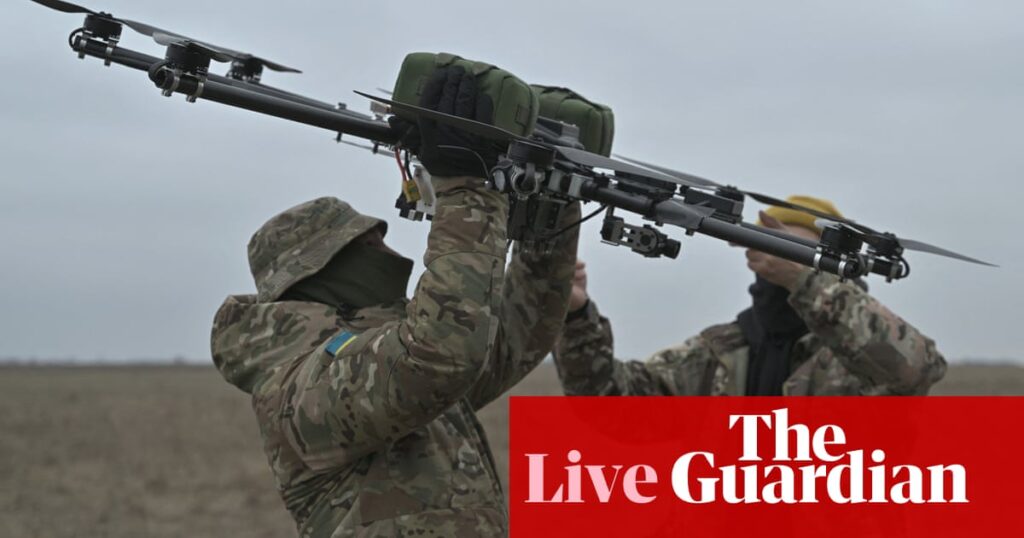Schools closed in Kursk after attempted Ukrainian incursion
Schools in the Russian city of Kursk are switching to online classes after an attempted Ukrainian incursion into the region, the TASS news agency cited local authorities as saying.
Ukraine-based armed groups claimed on Tuesday they had crossed the border into Russia’s Kursk and Belgorod regions, while Russia said it had prevented such incursions. The Kursk region also came under attack from Ukrainian drones overnight.
Key events
Summary of the day

Rachel Hall
Here are all the key developments in the Russia-Ukraine war today:
Thanks for following. I’m closing the blog for the rest of the day, but we will reopen it tomorrow morning.
European Union countries are set to agree on a new 5 billion euro ($5.46 billion) top-up to a fund used to finance military shipments to Ukraine, the Financial Times has reported, citing four officials briefed on the discussions.
Ukrainian Security Service said on Tuesday it has uncovered one of the largest networks in the country allegedly spreading pro-Russian “informational sabotage”, coordinated by a cleric of the minority Moscow-linked church.
Reuters reports:
Kyiv officials said Moscow planned to step up its informational war this spring, spreading disinformation in an attempt to divide Ukrainian society in the third year of its invasion.
The SBU agency said it has exposed 15 members of the network linked to Russia’s Federal Security Service (FSB), detaining four of them, including the cleric of a Kyiv-based temple of the minority Ukrainian Orthodox Church (UOC).
SBU said on its Telegram channel.:
It is one of the largest FSB networks that has been operating in Ukraine since the beginning of the full-scale invasion.
The group was involved in spreading pro-Kremlin narratives aimed at destabilising society and inciting religious hatred, according to the agency.
The church describes itself as independent, saying it cut ties with the Russian Orthodox Church, which supports Moscow’s war in Ukraine. A government commission has ruled that the church is still canonically linked to Russia.

Shaun Walker
The international Red Cross movement is under pressure to take action against the Russian Red Cross (RRC) over close links between the group and the Kremlin’s war and propaganda machine, The Guardian’s central and eastern Europe correspondent Shaun Walker writes.
The evidence includes the RRC president’s central role in a pro-Putin “patriotic” organisation, senior RRC staff who speak of the impossibility of peace with “Ukrainian Nazis”, and RRC participation in military training for children.
There are also allegations, revealed in leaked Kremlin documents obtained by the Estonian publication Delfi and shared with a consortium of outlets including the Guardian, that the Kremlin plans to replace the work of the international Red Cross on Russian-occupied territory in Ukraine by funding new, puppet Red Cross organisations.
n response to the previous publication of some of these allegations, the International Federation of the Red Cross (IFRC) said it was “reviewing the claims closely”. It is now under pressure from donor governments to take action against the RRC.
US preparing new military aid package for Ukraine
The United States is preparing a new military aid package for Ukraine that could be worth as much as $400 million, two US officials have told Reuters.
This would be the first such move in months as additional funds for Kyiv remain blocked by Republican leaders in Congress.
The officials, speaking on condition of anonymity, said an announcement was expected later on Tuesday.
One of the officials said that the funding for this package is from credits refunded to the Pentagon for recent purchases.
Separately, leaders of US intelligence agencies urgently pressed members of the House of Representatives on Tuesday to approve additional military assistance for Ukraine, saying it would not only boost Kyiv as it fights Russia but discourage Chinese aggression.
CIA Director Williams Burns told the House of Representatives’ Intelligence committee’s annual hearing on Worldwide Threats to US security:
That has consequences for American interests that go … directly to our interests in the Indo-Pacific.
That kind of an outcome will stoke the ambitions of the Chinese leadership, and they’re going to undermine the faith that our partners and allies in the Indo Pacific have in our reliability.
Russia’s elite is expecting President Vladimir Putin to reshuffle government positions to bring in younger people after what it sees as the formality of his resounding election victory this weekend, four sources close to the authorities have told Reuters.
In control of all state levers and with no serious political competitors, Putin – in power as president or prime minister since the last day of 1999 – is widely expected to win what will be his fifth presidential term and another six years in power.
The four sources, who declined to be named because of the sensitivity of the subject, said they expected younger people to be brought into more senior government positions, including perhaps as deputy ministers and heads of ministerial departments, and for an older generation of government officials to be demoted or retire after the election.
One of the sources said ministerial portfolios were being reviewed too and that the reshuffle was expected to take place in May.
Changes at major state corporations, state energy behemoths and in Russia’s more than 80 regional governorships are also seen as possible, the sources said. The Kremlin says it never comments on planned personnel changes ahead of time.
At a time when Russia is waging war with Ukraine and needs continuity, two of the sources said they did not expect Putin to change his defence and foreign ministers, however.
“You don’t change horses mid-stream,” said the first source, who added that it would be surprising if Defence Minister Sergei Shoigu, 68, and Foreign Minister Sergei Lavrov, who turns 74 later this month, did not keep their posts.
In office since 2020, Mikhail Mishustin, the 58-year-old technocratic prime minister, is also expected to keep his job, they said. So is Central Bank Governor Elvira Nabiullina, three sources said.
Planned changes at the top of major ministries and in security agencies will only take place after the end of what Putin calls his special military operation in Ukraine, the first source said.
Denmark unveils new military aid package
Denmark will provide a new military aid package including Caesar artillery systems and ammunition to Ukraine worth around 2.3 billion Danish crowns ($336.6 million), the Danish Defence Ministry has said in a statement.
In Russia, Tass has reported that the foreign ministry has imposed sanctions on 347 people from Latvia, Lithuania and Estonia which it claims are “hostile figures”.
Tass quotes the ministry claiming:
The hostile policy of the Baltic states towards Russia, active lobbying by Latvia, Lithuania and Estonia for sanctions measures against our country, interference in the internal affairs of Russia, persecution of the Russian-speaking population, a barbaric campaign for the mass demolition of monuments to Soviet liberating soldiers, rewriting history, glorifying Nazism, as well as the criminal line pursued to pump the Kyiv regime with weapons require retaliatory measures against those involved in these atrocities.
Germany’s military still lacks sufficient equipment and personnel despite a €100bn (£85bn / $109bn) special fund set up after the outbreak of the war in Ukraine, the parliamentary commissioner for the armed forces said on Tuesday.
Reuters reports Eva Högl said “Despite the remarkable efforts, it remains to be said that substantial improvements in personnel, equipment and infrastructure are still a long way off.”
Germany is in the second year of the “Zeitenwende” policy, announced by chancellor Olaf Scholz just days after Russia’s full-scale invasion of Ukraine in 2022. It is designed to deliver a more assertive foreign policy backed by more military spending.
Here are the latest images coming out of Belgorod, Russia, which according to local authorities was hit by Ukrainian drones this morning.
Summary

Rachel Hall
Here are the key developments from the day so far:
-
Schools in the Russian city of Kursk are switching to online classes, local authorities said, after an attempted Ukrainian incursion into the region.
-
Ukraine pounded targets in Russia with dozens of drones and rockets in a sweeping attack that inflicted serious damage on a major oil refinery and sought to pierce the land borders of the world’s biggest nuclear power with armed proxies.
-
Russia said its forces prevented incursions from Ukraine on Tuesday and inflicted heavy losses on the attackers, after Ukraine-based armed groups said they had launched cross-border raids.
-
French President Emmanuel Macron’s Ukraine strategy will be put to a symbolic vote in parliament’s lower house on Tuesday as political tensions rage in the run-up to June’s European Parliament elections.
Schools closed in Kursk after attempted Ukrainian incursion
Schools in the Russian city of Kursk are switching to online classes after an attempted Ukrainian incursion into the region, the TASS news agency cited local authorities as saying.
Ukraine-based armed groups claimed on Tuesday they had crossed the border into Russia’s Kursk and Belgorod regions, while Russia said it had prevented such incursions. The Kursk region also came under attack from Ukrainian drones overnight.
Russia’s foreign ministry has summoned Switzerland’s ambassador over the Swiss parliament’s approval of motions authorising the government to work on a way to seize and transfer Russian assets to fund reparations for Ukraine.
Russia summoned Ambassador Krystyna Marty Lang to protest at the narrowly passed Swiss motions which authorised the Swiss government to work on creating a reparations mechanism in international law for a country illegally attacked.
The foreign ministry said:
Russia strongly condemns this step by the Swiss authorities that grossly violates the fundamental principles and norms of international law regarding state immunity.
Any encroachment on Russian state property under the guise of any far-fetched ‘reparative mechanism’ would be nothing more than theft at the state level.
The ministry said Russia would retaliate if the Swiss plan was implemented. The Swiss foreign ministry did not immediately respond to a request for comment.
Switzerland said last year that it had frozen an estimated 7.7 billion Swiss francs ($8.81 billion) in financial assets belonging to Russians under sanctions designed to punish Moscow for its invasion of Ukraine.
Russia’s defence ministry has claimed that Russian forces have taken control of the village of Nevelske in Ukraine’s Donetsk region, the RIA news agency reported.
A Russian Il-76 military transport plane crashed in the Ivanovo region northeast of Moscow on Tuesday with 15 people on board, the Interfax news agency cited Russia’s defence ministry as saying.
Another agency, TASS, cited the ministry as saying one of the plane’s engines had caught fire, causing the crash. It was unclear whether there were any survivors.
Reuters has the full report on the drone strikes:
Ukraine pounded targets in Russia on Tuesday with dozens of drones and rockets in a sweeping attack that inflicted serious damage on a major oil refinery and sought to pierce the land borders of the world’s biggest nuclear power with armed proxies.
Russia and Ukraine have both used drones to strike critical infrastructure, military installations and troop concentrations in their more than two-year war, with Kyiv hitting Russian refineries and energy facilities in recent months.
Russia said Ukrainian proxies had sought to cross the Russian border in at least seven attacks which Russian forces had repelled. The Russian-speaking Ukrainian proxies said they had breached the border, a claim denied by Russia.
In one of the biggest Ukrainian drone attacks on Russia to date, Russia said it had downed 25 Ukrainian drones over Russian regions including Moscow, Leningrad, Belgorod, Kursk, Bryansk, Tula and Oryol. Many more drone attacks were reported.
Russian officials reported attacks on a slew of energy facilities, including a fire at Lukoil’s LKOH.MM NORSI refinery and a drone destroyed on the outskirts of the town of Kirishi, home to Russia’s second largest oil refinery.
Gleb Nikitin, governor of the Nizhny Novgorod region, posted a picture of a fire truck beside the NORSI refinery and said emergency services were working to put out a blaze there.
He said on Telegram:
A fuel and energy complex facility was attacked by unmanned aerial vehicles.
Industry sources told Reuters on condition of anonymity that the main crude distillation unit (AVT-6) at NORSI was damaged in the attack, which means that at least half of the refinery’s production is halted. Lukoil declined to comment.
NORSI refines about 15.8 million tonnes of Russian crude a year, or 5.8% of total refined crude, according to industry sources.
Striking Russian oil facilities is a problem for President Vladimir Putin as he faces off against the West over Ukraine, with domestic gasoline prices sensitive ahead of a March 15-17 presidential election.
The Kremlin said the Russian military was doing everything necessary and that what it calls its military operation in Ukraine would continue.
European Union leaders are ready to respond with new and significant measures against Iran amid reports that Tehran may transfer ballistic missiles to Russia for use against Ukraine, draft conclusions of a summit to be held next week said.
The draft text, seen by Reuters, said:
The European Council calls on third parties to immediately cease providing material support to Russia’s war of aggression against Ukraine.
Reports that Iran may transfer ballistic missiles and related technology to Russia for use against Ukraine are very concerning.
The European Union is prepared to respond swiftly and in coordination with international partners, including with new and significant measures against Iran.
Iran has provided Russia with a large number of powerful surface-to-surface ballistic missiles, six sources told Reuters, deepening the military cooperation between the two countries, which are both under US sanctions.
The conclusions also said the leaders would call on High Representative Josep Borrell and the Commission to prepare further sanctions against Belarus, North Korea and Iran.

